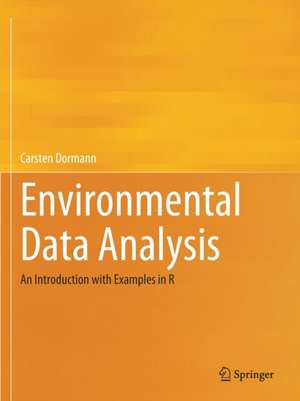Environmental Data Analysis: An Introduction with Examples in R
Autor Carsten Dormannen Limba Engleză Paperback – 21 dec 2021
| Toate formatele și edițiile | Preț | Express |
|---|---|---|
| Paperback (1) | 497.58 lei 6-8 săpt. | |
| Springer International Publishing – 21 dec 2021 | 497.58 lei 6-8 săpt. | |
| Hardback (1) | 656.43 lei 3-5 săpt. | |
| Springer International Publishing – 21 dec 2020 | 656.43 lei 3-5 săpt. |
Preț: 497.58 lei
Nou
Puncte Express: 746
Preț estimativ în valută:
95.21€ • 99.68$ • 78.78£
95.21€ • 99.68$ • 78.78£
Carte tipărită la comandă
Livrare economică 05-19 aprilie
Preluare comenzi: 021 569.72.76
Specificații
ISBN-13: 9783030550226
ISBN-10: 3030550222
Pagini: 264
Ilustrații: XIX, 264 p. 136 illus., 27 illus. in color.
Dimensiuni: 210 x 279 mm
Greutate: 0.65 kg
Ediția:1st ed. 2020
Editura: Springer International Publishing
Colecția Springer
Locul publicării:Cham, Switzerland
ISBN-10: 3030550222
Pagini: 264
Ilustrații: XIX, 264 p. 136 illus., 27 illus. in color.
Dimensiuni: 210 x 279 mm
Greutate: 0.65 kg
Ediția:1st ed. 2020
Editura: Springer International Publishing
Colecția Springer
Locul publicării:Cham, Switzerland
Cuprins
Preface.- The technical side: selecting a statistical software.- 1 Sample statistics.- 2 Sample statistics in R.- 3 Distributions, parameters and estimators.- 4 Distributions, parameters and estimators in R.- 5 Correlation and association.- 6 Correlation and association in R.- 7 Regression - Part I.- 8 Regression in R - Part I.- 9 Regression - Part II.- 10 Regression in R - Part II.- 11 The linear model: t-test and ANOVA.- 12 The linear model: t-test and ANOVA in R.- 13 Hypotheses and tests.- 14 Experimental Design.- 15 Multiple Regression.- 16 Multiple Regression in R.- 17 Outlook.- Index.
Notă biografică
Carsten Dormann is a Professor of Biometry and Environmental System Analysis at the Faculty of Environment and Natural Resources, University of Freiburg, Germany. After completing his PhD in Plant Ecology at the University of Aberdeen, UK, he went on to become a statistical ecologist, with a research remit spanning from conservation ecology to the development of statistical methods, and from field experiments to population modelling. He currently teaches statistics at the BSc and MSc levels, from introductory classes to Bayesian statistics and machine learning.
Textul de pe ultima copertă
Environmental Data Analysis is an introductory statistics textbook for environmental science. It covers descriptive, inferential and predictive statistics, centred on the Generalized Linear Model. The key idea behind this book is to approach statistical analyses from the perspective of maximum likelihood, essentially treating most analyses as (multiple) regression problems. The reader will be introduced to statistical distributions early on, and will learn to deploy models suitable for the data at hand, which in environmental science are often not normally distributed. To make the initially steep learning curve more manageable, each statistical chapter is followed by a walk-through in a corresponding R-based how-to chapter, which reviews the theory and applies it to environmental data. In this way, a coherent and expandable foundation in parametric statistics is laid, which can be expanded in advanced courses.The content has been “field-tested” in several years of courses on statistics for Environmental Science, Geography and Forestry taught at the University of Freiburg.
Caracteristici
Offers an introduction to statistical methods relevant for environmental science Is centred on the GLM as a general and flexible statistical approach Includes a back-to-back structure, with practical R code chapters complementing each example-driven, theoretical chapter Provides an essential foundation for further reading on Bayesian and machine-learning approaches
